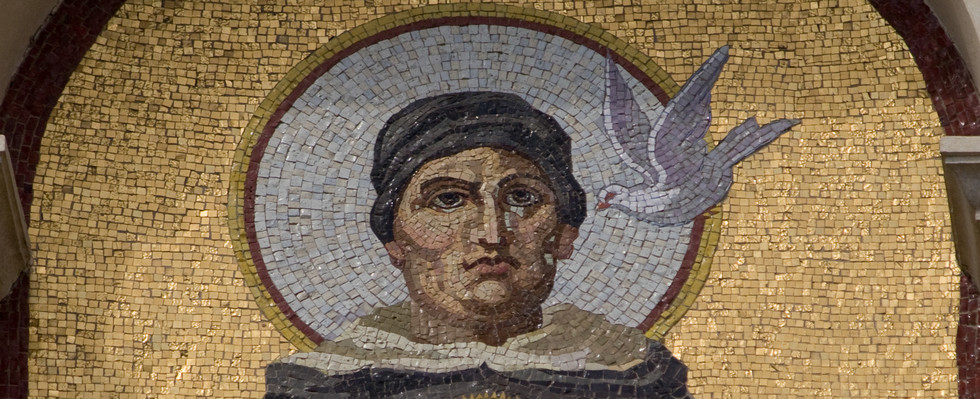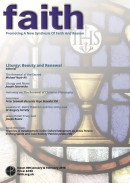The Renewal of Christian Philosophy
Edward Holloway FAITH MAGAZINE January - February 2016
An extract from a paper given by Fr Edward Holloway to the women religious of the Consortium Perfectae Caritatis International Congress in Rome, March 1973.
We must ask whether, in the early years of . . . [the 20th] century, there was any similar crisis of faith and intellect in the life of the non-Catholic Christian communities. We know very well there was. What was then called ‘Modernism’ in Catholic circles, divided and continues to divide those Churches in the very heart of their faith, witness and moral life. This self-division is the main reason for the loss of faith, practice and Christian in uence in the life of their peoples and nations. A Church without the literal Divinity of Christ is a Church without guiding authority over the life of man. It becomes little more than an association for generalised idealism and social moral welfare. The non-Catholic Churches can still tolerate this withering of spiritual life longer than we can, because with a married clergy, and only a few Religious Orders, the ordained minister can retreat within his own hearth at home, and draw around him a congregation to his own way of thinking.
Total certainty in faith and love
A celibate priesthood, a dedicated sisterhood in religion, cannot survive in this way. Your life and your joy depend upon total commitment, total certainty in faith and love, and the joy of union with Christ, in clear and undoubting faith. When all of this goes, not mere desire but a most dreadful loneliness enters the soul of the priest, and of the religious. It is this, the loneliness of uncertain faith, which is the principal reason for the wholesale defections, even as the same uncertainty kills vocations before they spring, or murders them in the seminary itself.
We know how the Church of the sixty years which preceded the .Second Vatican Council tried to defend itself against the inroads of this the new, radical Humanism. We are always hearing of the age of ‘Fortress Vatican’. At that time it was the only way in which the Church could have reacted. It had its real achievements, and it preserved intact the heart of doctrine and the spiritual life. Yet, it was essentially a defensive reaction, and it did encourage a Maginot Line mentality among theologians. The most this period could have done was to buy time for a fuller and better synthesis to be worked out between Catholic theology, and what is either well proven, or at least intrinsically probable in the philosophy of modern science, and the culture built upon it. The opportunity was lost despite the warning given by Cardinal Newman, in his Development of Christian Doctrine, and the time was wasted.
A long slow crisis of truth and error
I am not interested in the narrow issue of who was to blame, but in suggesting to you that the present crisis of faith and life in the Church is not an incidental confusion, but the culmination of a long, slow crisis of truth and error in theology, perhaps the greatest since the rise of Arianism, and that we may no longer refuse to admit it, and to meet it. The very Encyclicals of this century up to the Second Vatican Council, culminating in Humani Generis, demonstrate that the action taken by Pius X, in Pascendi Gregis, had deferred and slowed, but in no way had solved or resolved the crisis of Faith and Humanism. They show also that the root of the malaise of the Church, and of Christendom as a culture, did not lie and does not lie in structures, canon law, liturgy, or the use of the vernacular, necessary and urgent though reform in these spheres may have been. The heart of the crisis is a crisis of the intellect, in the order of that framework of philosophy through which theology is supported and explained.
The real reason for the calling of the Second Vatican Council was the resurgence of this crisis of Radical Humanism in theology, though most of the bishops, aware of a certain obsolescence in the life of the Church and the training of the clergy, were eager to see reforms without any true understanding of the leaven which was fermenting the centres of higher studies. There was so much justi ed resentment against obscurantism, excessive censorship and ultra-conservative taboos. Nevertheless, the face of the ‘new theology’ as it appeared over the blurbs of the paperbacks which came out everywhere during the sittings of the Council, though mostly young, and always handsome in exquisite grey suiting and silver grey tie, was in most cases the face of Humanism applied to the doctrine of the Faith.
Trent and the Two Vatican Councils
Some of us who have no deep learning in history, but yet a sense of history, found that assertive title—The New Theology—a little ominous. Four hundred and fifty years earlier a devout father had removed a brilliant boy named Thomas More from Oxford, because of the effect on his faith of the ‘New Learning’ which was in ferment there. You know how matters developed after that. The present Humanism, whether we call it scientific or existentialist, is only the natural and nal culmination of those principles of autonomy and nominalism in philosophy, which oversowed the New Learning. Yet, Thomas More as we know, was never content with the merely negative answer, nor did he fail to admire and assimilate the new wisdoms of his age. Apart from him, God raised up saints, scholars, and new religious orders in that period, to separate the dross of error from the gold of new truth. Today, we have to bring the same process to its ful lment as both the new truths and the speci c errors sown in the beginnings of the age of science ripen to harvest.
The saints, scholars, and Orders raised by Christ at that time, did not reform the Church by greater laxity and permissiveness, nor by wholesale laicisations given most readily on immediate demand. They did it, as witness the founding fathers of the Jesuits, by combining a new freedom in individual initiative and development, with self-discipline and obedience which was total in integrity and sincerity. With incidental di erences, much the same is demanded of us today. The modern scienti c civilisation, in which Marxism is capable of developing into a Humanism, and Western type Humanism capable of assimilating Marxist principles, is moving towards a unity which must be crowned by the head of God Incarnate, or the head of Man, who is his own god. It is not a di erent culture from that which began with the ‘New Learning’, it is its climax and the owering of its principles in both error and in truth: for there is also a owering of truth. What the Holy Spirit asked us to recognise and undertake at the Second Vatican Council, is the ful lment and further development of what both Trent and Vatican One sought to con rm and to further. It is not the repudiation of both those Councils, and of the whole historical development of the Church over the last 400 years, as we are often asked to believe.
Honesty and Renewal
I will honestly admit that I agree with the school popularly called ‘the new theologians’ that the structure and perspective of the scholastic philosophy which has been the framework through which we both viewed our theology and explained it in our adult catechesis, is out of date and needs further development. It was very likely to be out of date in some respects, because it has not su ered signi cant development since the 13th century. Indeed, the very Summa of St. Thomas is still clearer, better expressed and more convincing than some of the manuals based upon it, which were my own staple diet here in the Eternal City nearly 35 years ago. It is unlikely that the world which had moved into the atomic age, the world of Marx, Darwin, Freud and Einstein to mention only typical names, could be corrected and won back for Christ by the naked application of the learning of the middle ages.
Were St. Thomas alive today he would be livid at our stupidity and complacency. He would at once set himself to develop, realign and enlarge upon his own works, using the new learning and the new techniques of today. No doubt he would have made a wonderful job of it, but since unfortunately he now has other and more rewarding things to do, we lesser spirits have urgently to undertake the task as best we can. Such a development and realignment of the philosophia perennis can be educed. It does not require the jettisoning of the traditional theology and philosophy of the Church, nor of the entire perspectives developed in the Church from the rise of the Schoolmen. After the late Council there did take place in the centres of higher learning in the Church this wholesale jettisoning of the traditional wisdom of the Church, and I am bound to say that the undue subordination of all things to Ecumenism helped the process on, for the theology of the non-Catholic ecclesial communities has long been enervated by the same rationalist principles. Most of the bishops had little idea that such a ‘Palace Revolution’ had occurred during and after the Council in their universities and seminaries, they gave these new, eager minds free rein with the best of intentions. In fact however the old had been discarded, but nothing new and more true had been developed to replace it, and to ful l the hopes of the Council. The only alternative was the radical Humanist alternative which the Church had rejected with emphasis and fear 60 years earlier, and that alternative in even its most modern presentation is still untrue, and even more untrue, and it is the cause of the totally unexpected and devastating fruits of change which we see all around us.
No Fortress Vatican
Yet, we are not called to another era of ‘Fortress Vatican’, but to bring forth from the treasury of the Faith, as the householders of God ‘things both old and new’. That is to say, to forge a new synthesis of Catholicism, of Catholic philosophy, i.e. the philosophia perennis, and the proven wisdom of the modern age. We have to cease to be so afraid of ‘evolution’, whether as a biological theory or in the more important aspect of a unifying philosophy of growth and development embracing all created being in the one economy of this universe. In this more important philosophical sense, such an outlook or ethos is all-pervasive of modern life, and it underpins the conscious and the subconscious personality of the young.
God Transcendent
We can show how this process of creation manifests the existence of God Transcendent, because the universe is an equation of interdependent beings poised in a meaningful relationship, and remaining a unity even in the most complex ascent of being. Now equations. whatever their kind, are never random. We can also show the real distinction as principles of being, between matter and spirit, now very largely denied in the Catholic schools, and in this we can bring a vitally needed principle of correction to the extremely in uential thought of Pere Teilhard de Chardin.






